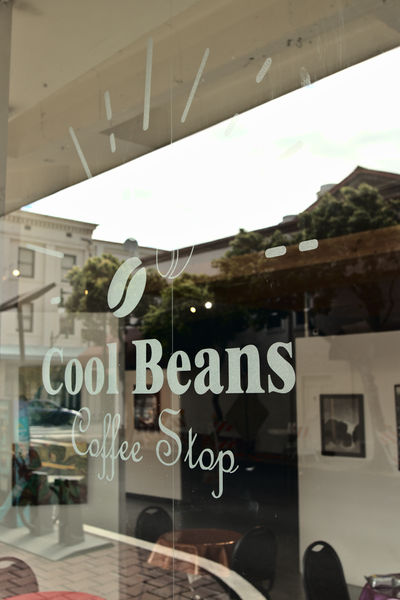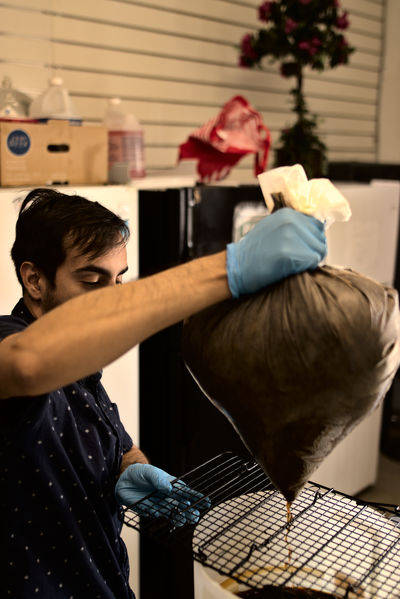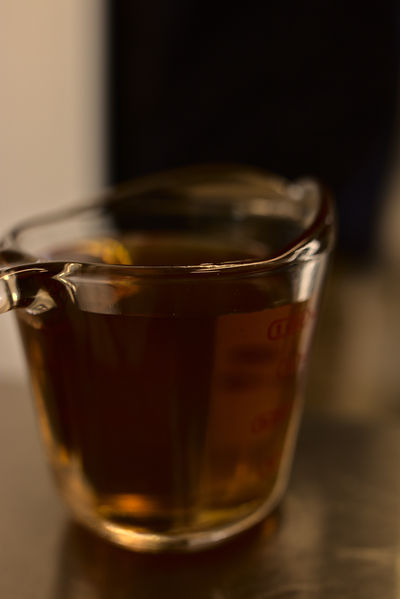

Sometimes cold coffee tastes better.
Ingredients: passion and pragmatism
A little story about the alchemy of cooking and when a dream seems to burst.
Portrait: Coffee alchemist and entrepreneur on the Hawaiian island of Oahu
In Honolulu, the capital of the US state of Hawaii on the island of Oahu, we visit the hip Chinatown. Our first stop is a small local art gallery "The ARTS at Marks Garage''. This is a non-profit art centre run by artists since 2001: exhibitions, performances, lectures and workshops attract locals as well as tourists. The place has a certain underground charm. At the end of the gallery, there is a small coffee corner hidden behind a red velvet curtain that seems inconspicuous at first glance. A few tables with colorful tablecloths and chairs suggest that you can stay here comfortably and in a relaxed atmosphere. The curtain that is supposed to separate the coffee counter from the rest of the gallery, as well as the rustic wooden counter, catch my eye – it looks charming and stylish: vintage and hipster style are elegantly combined. We have heard that the coffee is supposed to be very good here, but I do not see a coffee machine anywhere and am skeptical at first. I only see a young lady behind the counter smiling at us in a friendly and welcoming way. We smile back, but leave the gallery, stroll around the neighborhood for a while and browse antique shops and small bookstores in the same block until we need a refreshment and a break in the shade from the afternoon heat. We can't find a suitable place that would seem ideal and cozy enough, except for our first stop – so we go back to the art gallery. This time, a young dark-haired man is sitting behind the wooden counter, who immediately stands up as we approach it. He eagerly introduces us to his various coffee drinks. Only now do I notice that to my left is a glass refrigerator containing different types of coffee, which are packed in bottles. Now I also understand why I didn't discover a coffee machine at the beginning, because here mainly cold brewed coffee ("cold brew") is sold. Just the right thing! As we would welcome a refreshment we ask what he recommends. Very accurately and calmly, he explains to us which varieties he has on offer, where the coffee beans come from, which ingredients are used and we try everything: from Vegan Thai Coconut to Macadamia Nut Milk, Vietnamese Brew and Oat Milk Latte to Honey Cold Brew. At the same time, there are some homemade sweet baked goods on offer. You can tell that he knows what he's talking about, because all the coffee blends are made by himself, and so are the pastries. But we focus on the cold coffee first, because the decision is difficult. Nathaniel B. Cippele (34) has only been running his own coffee brand "Cool Beans Coffee Stop" for five months. When he talks about it, his eyes shine. We are very interested in how you can make your own cold coffee at home – that actually tastes good. Immediately the next day we meet in front of the art gallery with Nathaniel, whom everyone calls Nate. We are lucky, because today is his so-called "kitchen time". This means that once or twice a week he himself prepares and packs his coffee drinks in a rented shared kitchen. In a large refrigerator, the cold coffee brews for up to 24 hours. We therefore walk just a few blocks further to the shared kitchen. Accompanied by a transport cart with various local syrup variations, such as ginger honey, and a canister of distilled water that Nate is hauling in front of him.
Cooking and a new life in Hawaii
Nathaniel is from Springfield, Missouri. His father was born in Germany and his mother is Mexican. His specialty: sweet baked goods. "Give me a dessert and I can cook it right away," he says confidently. Already as a child, he developed an affinity for cooking. He likes to watch cooking shows, tries to imitate the dishes and experiments with different ingredients that he finds in the house. Nate especially likes to watch his grandma when she prepares tortillas and bread in the kitchen. The joy of cooking tempts him to complete an apprenticeship as a chef. Several years later, after various part-time jobs in various restaurants and cafés, he ended up working at Whole Foods, an American organic supermarket chain based in Austin, Texas. There he has various positions and realized that he feels comfortable in this industry and collects more and more knowledge. Nate soon seeks a challenge and applies for a higher position within Whole Foods in Hawaii – the position brings more responsibility and is paid better. There is no answer for half a year, until suddenly a phone call comes out of nowhere that they want to hire him for the job on the island of Oahu. He doesn’t think about it for long and within four weeks Nate packs up all his belongings. What he can't bring, he sells and travels to the Polynesian island for a new life. Six years have now passed and much has changed for him since his arrival in Hawaii. Together he now lives here with his long-time girlfriend Florence, who has accompanied him from the beginning, in a suburb of Honolulu – somewhat away from the tourist hustle and bustle.
When a dream bursts
The dream of becoming self-employed and having his own small business in gastronomy has been in his head for quite some time until it takes form in the outside world. He has not felt comfortable in his job for a long time. The initial euphoria has diminished by the negative working atmosphere. He resigns. The dream of being his own boss and building something independently tempts him and a long-time friend to become a business partner who also shares his idea. The entire planning for the project takes two years. Everything is refined, calculated and reconsidered down to the last detail. The business plan is in place and more than $10,000 has already been invested as start-up capital. Due to a lot of accumulated overtime, he has earned some savings. Nate is supposed to be the financial head and strategist within the business, because he is structured and organized, while his colleague is the coffee expert with many years of experience in this field. It seems like the perfect combination. The idea has developed into a concrete roadmap and the anticipation is incredibly great to finally get started. But as so often in life, things don't go as planned: exactly one day before the start, his confidant jumps off – his friend's doubts are too great. The uncertainty and fear of failure paralyze him. A world collapses for Nate at that moment, because he had already invested a lot of money, time and effort. He cannot comprehend and does not want to realize that his partner is letting him down. Nathaniel never wants to talk to his friend again at first, the trust is broken.
“I was a wreck for three days. Then I pulled myself up and made a plan.”

It seems as if after three days of being down he has an inspiration and knows exactly what to do next – like a phoenix from the ashes he gets up, his mind is suddenly very clear and immediately he comes into action. "I was a wreck for three days. Then I picked myself up and forged a plan," he describes soberly, as if this were completely self-evident. He slowly squeezes out the approximately two-and-a-half kilo coffee grounds over a sieve that lies on a larger container: The brown shimmering coffee concentrate drips off slowly – it smells seductively and intensely of fresh – albeit cold – coffee.
Within a week, he acquires everything you need to know about coffee beans and brewing cold coffee to gain a foothold in the business. Youtube videos are his teachers. "Today I can understand my friend. I don't blame him anymore. Without this experience, I would never have been able to teach myself everything. I learned so much about coffee that I wouldn't have considered possible," Nate explains, scraping condensed milk from a can, which he then mixes with the concentrated coffee. He and his former business partner are still friends today and see each other from time to time. Nate is not resentful, on the contrary: this experience makes him grow by gaining a lot of expertise within a very short time so that now he is an expert in the coffee field. In addition, his friends and Florence support him and give him courage.

“The first business idea will fail anyway. It's just part of the whole process.”
What helped him to get back on his feet was above all the trust in the business model and the belief in himself as well as the determination to do his own thing – whatever might come. "I've learned that I can achieve a lot in a very small amount of time. This is one of the biggest insights from this experience," says Nate and is grateful for his personal development. "The first business idea will fail anyway. It's just part of the whole process," Nate explains pragmatically and calmly, who sees setbacks and mistakes as a learning curve rather than taking them personally and getting lost in negative emotions, and learns from them to do things differently next time. I like his attitude. Often people think that they must have achieved this or that first in order to finally get started with their own projects: only when I reach X, then I can devote myself to Y. Instead of constantly waiting to get the green light from the outside, you should just start. The three most important insights he will take with him for future projects: to approach the authorities early so that licensing transactions proceed faster; conclude a solid contract with the business partner for unpredictability; and enough time investment in the local community to get to know it properly, as the mutual support is very valuable.
“I believe that everything will be fine. I just need another plan and everything will be fine. It just takes time.”

The biggest challenge at the moment, however, is Covid: at times, the gallery is closed and there are significantly fewer customers coming due to the regulations. His patience is put to the test again, because all shops have to close. But Nathaniel remains stoic. Since the pandemic, he has been making a $2,000 loss a month. But it's going uphill again, albeit slowly. "I believe that everything will be fine. I just need another plan and everything will be fine. It just takes time," Nate says calmly. While he carefully and accurately sorts the filled bottles into the black transport box, I notice his concise tattoos on his forearms. In Latin is written on one Fides and on the other Veritas – which can be translated as trust and truth. After a long break, he adds: "Even if something should go wrong, I know that there will always be a way to move on." I think of his product logo: three floating coffee beans framed by simple strokes – like a rainbow. They indicate the sun's rays and the rise of the sun. Similarly, Nathaniel seems to grow and shine from all the setbacks and disappointments.
Sustainability
In Hawaii, as in the USA in general, awareness of sustainability or environmentally friendly packaging is unfortunately not as advanced and present as in Europe. There is a fundamental lack of collective awareness of the topic of sustainability, as well as a lack of sufficient education and one's own drive to actually want to change something. I have to admit that the sight of all the plastic packaging hurts me and the fact that there is no proper waste separation or a solid recycling process in place. In addition, the corona situation has worsened the problem: the state allows most restaurants and cafés for hygiene reasons only disposable packaging. Nate is pessimistic about the development of more awareness for sustainability in the local population. In his opinion, the cultural shift is very difficult to achieve. He himself finds it bad that there is no regulated recycling process on the island and that what currently exists makes no sense. He is well aware of the problem: at least he and Florence use the used coffee grounds as compost, which is donated to NGOs for fertilization purposes within the district. Florence also makes her own coffee based body scrub, which they are selling. Although any kind of plastic packaging is not pleasant, everyone tries what they can and this is better than nothing. To Nate it is extremely important that local beans are used for the cold-brewed coffee: the Waialua coffee beans are sourced from the "North Shore" – the north of the island of Oahu.

Excursus: Interesting facts about coffee in Hawaii
Hawaii is the only one of the 50 American states where domestic coffee can be grown. This is mainly due to the economically optimal conditions that the remote eight main islands are offering for coffee cultivation: excellent temperatures, ideal altitudes and the volcanic fertile and nutrient-rich soil. In particular, Hawaii is known for the Kona coffee, which is mainly grown in the Kailua-Kona region of the Big Island. These beans are considered extremely high quality and are traded as some of the most expensive coffee beans in the world. In 1813, Don Francisco de Paula y Martin, Spanish translator and physician of the Hawaiian King Kamehameha the Great, brought the first coffee plants to the Polynesian island. Nearly more than a decade later, an American missionary planted the first Arabica trees (Arabica coffee plants) in Kealakekua, south of Kona. Over 700 family businesses grow coffee in the Kona area on the largest Hawaiian island, so the name "Kona Coffee" is well known to everyone. There are small coffee plantations on almost all islands, but no large-scale industrial cultivation.
Source: Vollmer, A. (2018). Hawaii (12th Edition). Reise Know-How Verlag.
“You have to trust your partner to make the right decisions”

A strong support
Florence (29) is from Colorado. She herself has also worked in the coffee industry for a long time. Florence is the one who motivates and supports Nate to live his dream and follows him everywhere. Especially in the difficult time when his business partner jumps off, she is the one who strengthens his back. From the beginning, she believes in him. "You have to trust your partner to make the right decisions," she explains, grinning at Nate, who is immersed in filling a mixture of black coffee and oat milk into a container. She has never moved out of her hometown before. When Nate desperately wants to go to Hawaii and build a new life there, she follows him without thinking twice. "If you want something, you do everything you can to make it possible," she explains. Next to the coffee counter on a wooden cabinet is a laughing Buddha statue, a plant and a basket with colorful bracelets. Florence makes them for pastime and fun. She helps Nate out in the shop from time to time or takes the place at the coffee counter for him, but they both focus on their own goals. She is a trained masseuse. However, both combine the experience in the grocery store and the coffee. Through the shared ups and downs in their nine-year relationship, both agree that emigrating to Hawaii has strengthened their bond.
Alchemy: passion and pragmatism
Nate is not a passionate coffee drinker himself, but he can get quite enthusiastic about coffee beans. So it's not necessarily the passion for the dark brown beans or the enjoyment of coffee that motivates him, but rather his passion for creating, trying out and tasting food and drinks; the development of new creations, in synergy with the desire to become self-employed – this is what drives him. He likes to experiment with new flavors and tastes everything very carefully and conscientiously. Again and again he hands us samples of his cold coffee brew and asks for our opinion. He would like to integrate his experience from previous jobs into his own heart project. For Nathaniel, cooking is like a science, similar to mathematics or physics. Like alchemy, you throw ingredients or numbers together until something new is created. These are the areas where he can be completely himself. In the future, he would like to combine the fields of cooking and information technology. He holds appropriate degrees in both areas. Structure and order are his cornerstones. On a yellow Post-it, which is pinned on the metallic kitchen counter, the individual steps for the coffee preparation process are listed in order with clean handwriting. "I am a very organized and structured person. When someone doesn't work like me or confuse concepts, it can sometimes cause trouble," grins Nate, who admits that he prefers to be his own master and do things the way he thinks they are right. He sees the preparation of the cold coffee as a meditative act and usually listens to music. He enjoys being alone in the kitchen and not being disturbed by anyone.

























